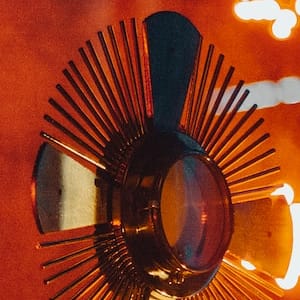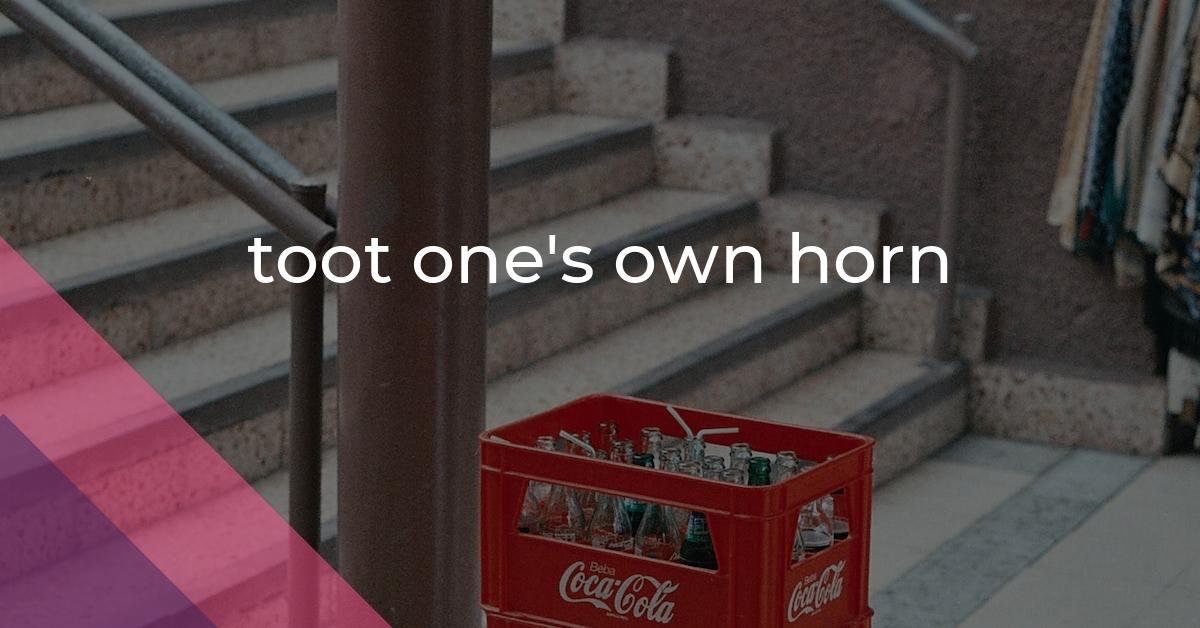toot one’s own horn: Idiom Meaning and Origin
What does ‘toot one's own horn’ mean?
The idiom "toot one's own horn" means to boast or speak highly of oneself and one's accomplishments. It often implies a sense of self-promotion and seeking attention or recognition for one's abilities or achievements.

Idiom Explorer
The idiom "up one's own ass" means to be self-absorbed, arrogant, and overly focused on oneself without considering or valuing others. It signifies a lack of awareness or concern for the needs or perspectives of others.
The idiom "under one's own steam" means to do something without any assistance or support from others.
The idiom "touch oneself" is an informal expression that refers to a person masturbating or engaging in self-stimulation sexually.
The idiom "to speak of" means to mention or discuss a particular subject or topic. It is used to draw attention to something noteworthy or significant.
The idiom "top oneself" means to commit suicide. It is a colloquial expression and should be used with caution due to its sensitive nature.
The idiom "to one's mind" means expressing one's opinion or viewpoint on a subject or issue. It refers to the thoughts and beliefs that someone holds, indicating personal perspective.
The idiom "too big for one's britches" means to be overly confident or arrogant, behaving as if one is more important or capable than they actually are.
"Too big for one's boots" means to have an exaggerated sense of one's own importance or ability. It implies that someone thinks they are more powerful or skilled than they actually are, leading to arrogance or overconfidence.
The idiom "toast of the town" refers to a person who is highly praised and celebrated in their community or social circle. They are the center of attention and admired by many.
The idiom "tip one's hat" means to show respect or admiration towards someone or something. It is a gesture that originated from men tipping their hats as a sign of courtesy or acknowledgement.
Melodic Self-Applauding Secret Revealed
The idiom "toot one's own horn" is used to describe someone who boasts or speaks highly of their own accomplishments or abilities, sometimes excessively or with an arrogant tone. Its meaning is rooted in the sound produced by blowing into a horn, such as a trumpet or a trombone. This confident and attention-seeking behavior is often associated with the idiom, which has become a common expression in the English language.
The idiom "toot one's own horn" is similar to the idiom "blow one's own trumpet". Both phrases convey the act of self-praise or boasting. While "toot one's own horn" refers to someone speaking highly of their own accomplishments, "blow one's own trumpet" conveys a similar meaning. The use of different idioms to represent the same concept adds variety to the language and allows for different expressions of self-praise.
A related idiom that conveys a negative connotation is "up one's own ass". It describes someone who is overly self-involved or self-centered, often with a disregard for others. This idiom emphasizes the negative aspects of self-praise and boasting, suggesting a level of arrogance or self-importance. While "toot one's own horn" focuses on the act of self-praise itself, "up one's own ass" highlights the attitude and behavior associated with excessive self-promotion.
The idiom "toot one's own horn" can also be connected to the phrase "show off". This phrase is used to describe someone who seeks attention or admiration by displaying their skills, possessions, or accomplishments. While "toot one's own horn" specifically refers to self-praise, "show off" encompasses a broader range of behaviors that aim to impress others. Both idioms highlight the desire for recognition and validation, albeit through different means.
Another related idiom is "full of oneself". This phrase describes someone who is excessively self-centered or self-assured, often to the point of arrogance. It conveys a similar meaning to "toot one's own horn" by emphasizing the negative aspects of self-praise and boasting. While "toot one's own horn" focuses on the act itself, "full of oneself" depicts the overall attitude and demeanor of a person who engages in excessive self-promotion.
The phrase "talk up" is yet another related idiomatic expression that relates to self-praise and boasting. It is used to describe someone who speaks highly of themselves or their abilities. While "toot one's own horn" and "talk up" share a similar meaning, "talk up" can also be used in a broader context to describe someone promoting or endorsing something or someone. This difference in usage adds nuance to the language and allows for different applications of self-praise.
The idiom "toot one's own horn" is a familiar expression in the English language that is used to describe self-praise or boasting. Its association with the sound produced by a horn adds a vivid metaphor to convey this behavior. The idiom is similar to other idioms such as "blow one's own trumpet" and "talk up", which all highlight the act of self-praise. It can also be connected to idioms such as "up one's own ass" and "show off", which emphasize negative aspects of excessive self-promotion. The variety of idiomatic expressions related to self-praise adds depth and richness to the English language.
Example usage
Examples:
- Sheila always toots her own horn at work, constantly bragging about her accomplishments.
- Instead of allowing others to recognize his skills, Mark takes every opportunity to toot his own horn.
- During the interview, the candidate tooted her own horn by highlighting her strong track record in sales.
More "Pride" idioms



